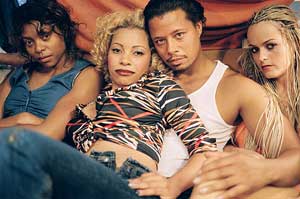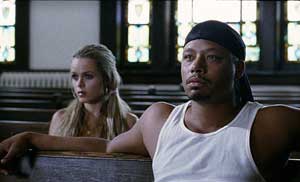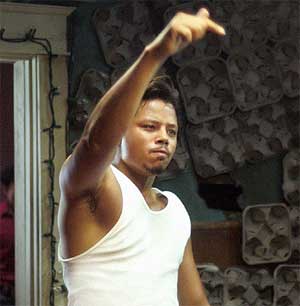 I am going out on a limb here – if Terence Howard doesn’t get an Oscar nomination either for his work in Crash or (preferably) Hustle & Flow, I am calling bullshit on the whole Academy. Between these two roles this year, Howard has shown himself to be an actor of stunning range and ability. I’m seeing Four Brothers tomorrow and hoping that he brings some of his great acting to that film.
I am going out on a limb here – if Terence Howard doesn’t get an Oscar nomination either for his work in Crash or (preferably) Hustle & Flow, I am calling bullshit on the whole Academy. Between these two roles this year, Howard has shown himself to be an actor of stunning range and ability. I’m seeing Four Brothers tomorrow and hoping that he brings some of his great acting to that film.
Howard’s nothing like his Hustle & Flow character DJay. They do have some things in common – affable charisma, for one. And they’re both musical – but Howard plays country and folk music (he jokes that he tried to get director Craig Brewer to make DJay a country singer). In person he’s modest and nice, but also has a presence that fills a room. Howard sat down with producer Stephanie Allain to talk to a room full of journalists about Hustle & Flow (read my review here to find out just how much I really liked this movie). Here’s what they had to say.
Q: You’ve had an amazing year between Crash and this, but you’ve been making movies for a long time, but how does it feel that suddenly, everyone is discovering you?
Howard: Well, you know, I think a basketball player knows he’s a good basketball player before he gets in the NBA. Believe in yourself first. I’m not really aware of people being aware of me beyond you guys telling me, you know? The only thing that really matters in the initial part of my career, the worst mistake I’ve ever made was try to do things to please the audience thinking how the audience is going to respond if I do this. And when I stopped doing that and started thinking about what feels natural and what feels right to me and started pleasing myself, then it became good. So I’m appreciative that people are liking what I’m doing, but whether they like it or not, it doesn’t matter, because I won’t change what I’m doing.
Q: The two roles are so completely different as is the role in Ray. Is there a conscious decision in your part to try to take things that won’t be similar?
Howard: No, most of the decisions that I make with regard to taking roles, I just look for something that’s challenging, something that I think I can accomplish, you know. With Hustle and Flow I didn’t think I could accomplish. I didn’t think I could pull off the rapping. I didn’t think I could pull off the pimping it. I didn’t think I could pull off half of the things that was necessary and Lawrence Fishburn took me to Beverly Hot Springs and made me get naked in the damn water around all these men, which I was uncomfortable with and then he slid over next to me, put his arm around me and now, I’m really uncomfortable in this hot tub. And he’s not gay. He’s just very free and easy. And he looked at me and was like, “You know, you’re going to have to take one of these movies under your own wing, and it can’t be something easy.” And I said, “Okay”, and that’s when I told John I was going to do the movie. It was like it was time to step into something more and try something deeper then what you think you can do.
Q: How did you get into acting? You went to Pratt (Institute)?
Howard: Yeah, chemical engineering. I am an engineer, but what I find important and necessary is that you just learn things as you go along. One day I’ll go and get my masters in physics and go and do all that stuff, but right now, I got deviated into this artistic world and I’m so appreciative that I have the opportunity. I feel like the alchemist that’s supposed to be a shepherd with sheep and now I’m in this caravan learning to be an alchemist.
Q: Did you ever think you’d drop out of this and go back to being an engineer?
Howard: Yes, I mean my thing wasn’t just engineering. I just wanted to be a scientist. I wanted to be a scientist, and people like Craig Brewer saw me as something more. I was ready to drop out years ago and Stephanie wouldn’t let me leave.
 Q: How did your grandmother influence your acting?
Q: How did your grandmother influence your acting?
Howard: Well, I watched her. I didn’t have training but for 20 years I watched her and she would have a little tape recorder like this and she used to record all the parts of the other people and then she would say her lines. That’s how she rehearsed. She found that I had an excellent memory because one day, when I was 7 years old, and she hit the stop button before going to the next thing, I said the other person’s line and she responded to me and then I said the next one and we did the whole scene, and we did all her rehearsals together with her. And she used to thank me, like I’d done something great for her. If you saw Ain’t Supposed to Die a Natural Death, that was my great-grandma Minnie Gentry. She was the best actress in the world. That was my training.
Q: At one point, DJay was in the bathroom looking in the mirror trying to psyche himself up for his big break. Ms. Allain, was there ever a point where you felt that way and how did you get past that?
Allain: Yeah, there were a couple times when Craig or Terrance called to say they can’t do this anymore, and I was still being the beacon of hope. It’s going to happen. Just hang in there. How do we keep ourselves alive to do it, but ultimately, I think I really did deep down know we were going to get the movie made. And whatever it took to get there, I was willing to do it. It’s like a child, you know. You’ll do anything to protect that child, and that’s how I felt, so it got rough. It got hairy. But it was the burning love that kept it alive.
Q: How did you first meet Craig?
Allain: I read his script for Hustle and Flow, that’s how I first met him. I just fell in love and then I saw his movie, The Poor & the Hungry, which was a small little movie he made, and I really fell in love and then I called him up and begged him to let me produce the movie.
Q: Stephanie, is it true that you put up your house for this movie?
Allain: I did. In the biggest housing boom in history, I put up my house, but you know what? It was worth  it. It was so worth it, because freeing myself of those material things that I was working to keep up allowed me the freedom to stay the course, and you know, I moved into a tiny little apartment. I had been a home owner for 16 years and it was rough to have to rent, but it was so worth it, and I’m so grateful that I had that presence of mind to let those things go. The reason I did it. The movie is about trusting your creative instincts and how you can change your life if you do, and I feel like we all went through that process in the making of the movie and that’s why we’re here today.
it. It was so worth it, because freeing myself of those material things that I was working to keep up allowed me the freedom to stay the course, and you know, I moved into a tiny little apartment. I had been a home owner for 16 years and it was rough to have to rent, but it was so worth it, and I’m so grateful that I had that presence of mind to let those things go. The reason I did it. The movie is about trusting your creative instincts and how you can change your life if you do, and I feel like we all went through that process in the making of the movie and that’s why we’re here today.
Q: Can you talk a bit about the state of black films today? You’ve obviously been working with John [Singleton] since Boyz in the Hood. Why does it take a movie to be independently financed to be able to discover such amazing talent like the one you had in this movie and a movie like Baadaasss which also took forever to get financed?
Allain: Because I think the people in power at the studios are not on the forefront. It’s the artists on the forefront, so it’s hard for them to see something totally new and get the uniqueness of it, and the fact that audiences want something really fresh and unique. So this movie, which thank god we didn’t get made in the studio system, because it would not be the same movie that it is today.
Howard: It would have been a rapper.
Allain: It would have been a rapper in the role and they begged us to lose Terrance and come up with a list of music artists that should play DJay and it would just have been different, so I think being forced to go outside the studio system has been a blessing for us.
Q: So Terrance, does this open up your rap career opportunities now?
Howard: No, it was a wrap when they yelled “wrap” on August 4th and to clear something earlier, I’m still three credits short of my degree.
Q: So Crash was made before this. Did it have any effect on you or did it ever resonate even unconsciously, the contrast of the one to the other?
Howard: No, but I had this accent with DJay for four months and I couldn’t talk without talking like him, but the moment they yelled “wrap” and I went to North Carolina to start My Life in Idlewild, it all disappeared and it’s funny it’s like that. You just drop a character like this that and the other and it’s done. And I’m sure it affects me now in my present life because I don’t know, you go a little crazy and you can’t help it. But you’re able to drop something and move on, drop it and move on and it was like a dream. Every little job becomes a dream, and you don’t recall it anymore, and maybe you might have a déjà vu moment, but it’s like something you dreamed earlier. That’s what dropping out of Crash was and coming into Hustle and Flow was like.
Q: And then you’re continuing your relationship with John. What’s it like going from this to something like Four Brothers?
Howard: On Four Brothers he was a director and with this movie he was a producer. I had never worked with John. John’s style of directing is that old style, hit your mark, say your line. Don’t ad lib. That’s not me. I don’t know how to just hit my mark and say my line. I ad lib. I’ve gotta bring my own into it. So that was very, very difficult, because even though I love him and respect him as a producer and as a person/writer, but our ways of working doesn’t really coalesce together, so we’re going to be friends. (laughs)
Q: DJay is such a full character and there’s so much depth to him. Was that all in the script from when you first read it or is that something that developed over time?
Howard: Craig had him from Day 1. That was the only movie I really didn’t ad lib on was Craig’s because I didn’t need to. You ad lib to fill holes.
 Q: There was no improvisation?
Q: There was no improvisation?
Howard: Not for DJ in this movie. Every word, beyond me saying “Nigger”. The cursing and the “Nigger” was what I put in there because was what I felt and heard on the streets, and I wasn’t going to take that out. I was like this is missing here. This is unreal and we need this. I make documentaries. Even though they’re staged documentaries, but that’s what I like to shoot, is a documentary.
Q: Would you make a film yourself?
Howard: What’s funny is that Jim Sheridan told me two weeks ago, because I’m doing a film with him now, is that you really should direct, Terrance, and when you direct, I will executive produce you. So I’ve got some ideas.
Q: How did you like being in Memphis and was it different from what you expected?
Howard: It was hot and muggy and “peace”. I mean, you had to be careful with some of the people down there, but most of the people were so genuine and nice to me.
Q: Did you meet some pimps?
Howard: 123 pimps I interviewed and 78 prostitutes over the course of two years to gather the information for this character completely.
Q: One of my favorite lines was when Anthony said “Some walk the walk” and etc. Has anyone ever said anything similar to you in your life?
Howard: Nah. (laughs) I mean, there’s people that said some incredible things to me about you must maintain your majestic composure at all times. That’s something my uncle said to me. He said you’re a young prince and someday you’re going to become king, but nobody ever told me to “shut up and walk” but DJay needed to hear that. He needed to hear that because all he was a fast talker.
Allain: And if you notice, the movie starts on his mouth talking and ends with him walking.